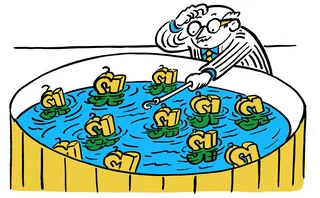

Esma turns the screw on direct electronic access
Guidance thwarts narrower definition adopted by Eurex to help third-country clients
Need to know
- Mifid II introduces new rules surrounding end-users electronically accessing exchanges in the European Economic Area, known as direct electronic access, or DEA.
- Market participants had developed different interpretations of DEA based on an exemption if end-users are not able to exercise control over the exact moment an order entry is made.
- This clause led Deutsche Börse to conclude that end-users accessing its futures exchange, Eurex, do not do so through DEA.
- It also led to brokers questioning whether the access they offered clients was DEA.
- Clarification by European regulators appears to have broadened the DEA definition and spiked the Eurex interpretation.
- Firms that use DEA to trade on an EU exchange have to be Mifid-regulated or deemed equivalent.
- There is uncertainty as to the process the European Commission will take to grant equivalence for investment firms.
Asking for forgiveness instead of asking for permission might seem a risky way of responding to new financial regulation. And yet, Germany’s Deutsche Börse appears to have arrived at an interpretation of the second Markets in Financial Instruments Directive (Mifid II) which is not shared by regulators.
Within the legislation is a term known as direct electronic access, or DEA. The term is supposed to define trading activity where an end-user electronically accesses a venue’s order book by using a member’s trading code. Once Mifid enters into force in January 2018, only a Mifid-regulated investment firm, or a third-country firm deemed equivalent to Mifid by the European Commission, is supposed to provide DEA on European exchanges to clients. And those clients must also be Mifid-regulated or equivalent.
There was confusion among market participants as to what activity actually constitutes DEA. In a presentation published on November 10, 2016, Deutsche Börse claimed that electronic access on to their exchanges, Eurex and Xetra, was not DEA because the end-user could not determine the exact fraction of a second the order was sent to their exchanges (see box: Defining ‘control’). Their reasoning was based around requirements within the German Exchange Act.
But on April 5, the European Securities and Markets Authority seemed to directly contradict Deutsche Börse’s interpretation in a Q&A document. According to Esma, the ability to access an exchange through DEA should be determined based on an end-user’s ability to be able to control the exact fraction of a second when orders are sent, rather than when the order hits an exchange’s matching engine.
“The Esma Q&A clarifies that the time taken to reach a trading venue does not have any influence on whether an order can be considered DEA or not, but rather it is the control that the client has that dictates whether a client has the ability to exercise DEA,” says a senior manager at an industry association, in an email to Risk.net. “Any human intermediation at the broker takes that order entry discretion away from the client, but any latency added by risk controls and order routing does not take away that order entry discretion.”
They continue: “The Deutsche Börse argument rested on risk controls adding varying latency so that the market participant did not have discretion over the exact fraction of a second the order hit the matching engine.”
In an emailed statement to Risk.net, a Deutsche Börse spokesperson said futures exchange Eurex had been regulated for around 20 years by the German Exchange Act, which describes how indirect clients interact with direct market participants. That will change with the advent of Mifid II.
“There has been a lot of uncertainty about the nature of the DEA provisions in the market. Mifid II will change this legal framework, and Eurex will adhere to the new DEA provisions as we have adhered to new legislation in the past. Esma’s latest guidance on the definition of DEA has been very helpful.”
Global question
The consequence of Esma’s ruling means that end-users electronically accessing Eurex will be in scope of the Mifid II rules surrounding DEA. For clients based outside of the European Economic Area it potentially means they can no longer access Eurex through electronic means.
“Eurex is a very international market, with indirect users from all over the world. There are Asian asset managers who want to have European exposure and there are lots of American institutions as well,” says a senior manager at an exchange based in the EU. “Most of them obviously use some electronic means through their broker. If order routing is classified as direct market access [a form of DEA] then those firms in all of those countries where there is no equivalence decision would effectively need to stop.”
According to the level one legislative text of Mifid II, firms that deal on own account but are using DEA to access an exchange have to be authorised under Mifid II. A Frankfurt-based partner at an international law firm stated this requirement was within the draft German implementing act to transpose Mifid II, known as Fimanog, published on January 23.
It is understood there is a transitional provision in the Fimanog which will allow firms dealing on their own account a one-year transition period before they have to register under Mifid II.
If an exchange’s business model is affected by local restrictions based on how their jurisdiction views access to their market, then I think the exchange is going to try to do everything it can to get around some of those restrictions
Industry source
Eurex is one of the largest trading venues for firms dealing on their own account. Many proprietary trading firms access the exchange from outside the European Economic Area. Upon Mifid II going live, those firms will have to be deemed equivalent within one year.
“I think there is more of a concern on general equivalence discussions. The crucial question here is: what is equivalent? This is something that is on the table of the EC,” says a market structure expert at an EU exchange.
There is also uncertainty as to whether brokers based outside of the European Economic Area will be able to offer DEA.
The level one text of Mifid II states that regulated markets, multilateral trading facilities and organised trading facilities have to ensure that members providing DEA are authorised under Mifid II or the Capital Requirements Directive. This would mean the entity would have to be based in the European Economic Area.
Some national legislators have softened this requirement in their transposition of Mifid II. The senior manager at the industry association believes Germany is one of those jurisdictions taking a more relaxed view.
The Frankfurt lawyer says the Fimanog does allow for third-country firms to receive a dispensation if they are authorised in their home country, although he is unsure whether this would apply to DEA. But a London-based partner at another international law firm says the German implementing law has an obligation on regulated markets to ensure DEA providers are Mifid investment firms or Capital Requirements Directive credit institutions. If this clause remains in the final version, the third-country dispensation may not apply to DEA.
Before Esma issued its guidance, Eurex had clearly hoped these third-country issues would not be a problem, by assuming the activity wasn’t classed as DEA. With the Esma ruling, however, firms dealing on own account will have to rely on equivalence being granted to their jurisdictions during the one-year transition period. Brokers will also need to be given a dispensation to continue offering DEA.
“So can somebody from the US offer DEA? Then the question is: what is allowed to be offered by an equivalent firm? And there we are back with the EC,” says the market structure expert at the EU exchange.
Defining ‘control’
Deutsche Börse’s interpretation of EU direct electronic access (DEA) rules had rested on an exemption outlined in a delegated regulation adopted by the European Commission on April 25, 2016. The exemption stated that a person is not capable of DEA if the person cannot exercise control over “the exact fraction of a second of order entry and the lifetime of the order within that timeframe”.
A senior manager at an industry association believes this exemption was added so as to exclude retail investors using online brokerages.
The phrase “fraction of a second”, however, also led Deutsche Börse to conclude that it did not offer DEA at all.
The reason for this interpretation was because German exchange law requires members of German exchanges to apply a series of pre-trade risk controls on orders being sent to those exchanges. Due to the risk controls, the end-user does not have control over the exact fraction of a second when an order was sent from a broker to the exchange.
It is understood exchanges in Germany and Bafin, the domestic financial regulator, had created a proposal for Esma which outlined that order routing in Germany was separate from DEA.
A source close to the matter says it was intended to be sent to Esma in April so the pan-European standard-setter could review the idea. It is unclear whether the latest Q&A is a direct response to the proposal but it does refute the interpretation Deutsche Börse had adopted.
Ulterior motive
It is not clear how the equivalence determinations between EU investment firms and other jurisdictions will work.
It is understood the EC has embarked on equivalence determinations for third-country exchanges by prioritising certain jurisdictions. Its approach to investment firms is still being developed. In the past, equivalence determinations have often taken several years to complete.
Sources speaking to Risk.net believe the interpretation adopted by Deutsche Börse was motivated by the third-country dilemma.
“In this situation there is obviously a little bit of a game being played. Markets have grown globally and have looked to attract market participants from outside of their country particularly by offering points of presence in other countries. If that exchange has their business model affected by local restrictions based on how their jurisdiction views access to their market, then I think the exchange is going to try to do everything it can to get around some of those restrictions,” says an industry source.
The London-based lawyer believes it could have been a move to ensure firms based in London could still access the exchange electronically post-Brexit.
“It’s kind of wink wink, nudge nudge; DEA doesn’t exist and so this is not an issue for us and keep trading with us,” says the partner.
In response to the claim, the spokesperson for Eurex stated: “Eurex was subject to the same uncertainty as the whole industry, and we welcome Esma’s latest guidance. Until now, orders sent via order routing systems to Eurex are covered by the German Exchange Act. That is the background against which we worked with our national regulator. So this was not motivated by specific considerations, but by an approximately 20-year-old regulation. In the future, these orders will be subject to Mifid II provisions. As Europe’s largest derivatives exchange, Eurex will be fully compliant with all new requirements.”
Competing interpretations
The Esma Q&A has wider implications for market participants in the European Economic Area as it provides more certainty as to what activity is DEA and potentially resolves differences in interpretations.
One key difference was between Deutsche Börse and Ice Futures Europe, the UK-based futures exchange. Ice Futures Europe had been taking the view now confirmed by Esma: that order routing with pre-trade risk controls still counts as DEA.
Laurence Walton, director of regulatory policy at Ice Futures Europe, says: “The broker would provide an order routing service to its customer. The customer would use the broker connection between itself and the exchange. So that would be the order routing element and then the order would go through the pre-trade risk controls at the broker before then going into the exchange. Typically that would be done in a straight-through processing fashion, so that would be one mechanism that would fall within DEA in our view.”

The differing interpretation between exchanges had established differing standards across Europe for brokers to comply with, as it seemed order routing in one country was DEA while in another it wasn’t.
Speaking before the Q&A was published, the London-based lawyer stated: “It potentially means you have an exchange like Eurex which has a different set of parameters than Ice Futures Europe. That cannot be what was intended. We have been looking at this with some of our clients: how do you work around some of these distinctions and differences? The answer perhaps is, until we get that guidance from the EC and Esma, there may not be a way to work around it. You probably just have to approach both of them head on and ask: is it DEA in Germany? Is it DEA in the UK?”
Deutsche Börse was not alone in taking a broad interpretation of the exemption from DEA. Brokers had also been looking at their own systems and trying to assess whether they offered DEA.
If a member of an exchange is providing their clients with DEA, Mifid II applies a set of requirements for firms to have in place. These include real-time monitoring of their DEA clients; systems to detect market manipulation; pre-trade controls that could automatically block orders; and post-trade controls.
For larger brokers, this is less of a problem as the controls are implemented as best practice – and to avoid confusion. For smaller brokers, however, the interpretation of “the exact fraction of a second” meant there was a possibility they could save resources and not have to implement the necessary controls.
“Any systems development which Mifid II would require has a cost associated with it. For smaller firms it is a greater burden than for a large firm that may or may not have something similar in place for which a system development is a small incremental cost in the budget,” says a second partner at a law firm in London.
Esma’s interpretation means smaller firms will now have to establish the necessary controls. But the senior manager at the industry association points out that some firms may still take an alternative interpretation of the rules to seek an exemption.
“The Q&A addresses the Deutsche Börse interpretation. It still leaves open a possible interpretation that only algorithmic trading can enter an order within an exact fraction of a second, not a human pointing and clicking on a screen. The view that DEA can only include algorithmic trading is not one that is widely held, but the Q&A leaves this open to interpretation,” says the senior manager.
Only users who have a paid subscription or are part of a corporate subscription are able to print or copy content.
To access these options, along with all other subscription benefits, please contact info@risk.net or view our subscription options here: http://subscriptions.risk.net/subscribe
You are currently unable to print this content. Please contact info@risk.net to find out more.
You are currently unable to copy this content. Please contact info@risk.net to find out more.
Copyright Infopro Digital Limited. All rights reserved.
As outlined in our terms and conditions, https://www.infopro-digital.com/terms-and-conditions/subscriptions/ (point 2.4), printing is limited to a single copy.
If you would like to purchase additional rights please email info@risk.net
Copyright Infopro Digital Limited. All rights reserved.
You may share this content using our article tools. As outlined in our terms and conditions, https://www.infopro-digital.com/terms-and-conditions/subscriptions/ (clause 2.4), an Authorised User may only make one copy of the materials for their own personal use. You must also comply with the restrictions in clause 2.5.
If you would like to purchase additional rights please email info@risk.net
More on Mifid
Esma guidance on swaps transparency still leaves questions
Volatile instrument attributes removed from transparency determination, but further issues remain
Mifid II research unbundling hits Japan’s asset managers
Japanese and European investors may face different payment models for investment research
Mifid’s great race to the bottom
If rules are unclear, regulators cannot prevent banks adopting the softest interpretations
Banks claim front-office content is safe from Mifid II
Work of ‘desk analysts’ is not research, banks argue; lawyers are not so sure
MTF bilateral trading protocol offers Mifid arbitrage
Nordic banks to use protocol to benefit from longer deferral period
Delay on EU pre-trade, commodity rules ‘risky’
Local authorities will apply key elements of Mifid II temporarily, owing to Esma backlog
Mifid II – The regulatory reporting challenges that lie ahead
Sponsored feature: NEX Regulatory Reporting
Mifid II position limits: Preparing, monitoring and reporting in the new regime
Sponsored webinar: FIS








